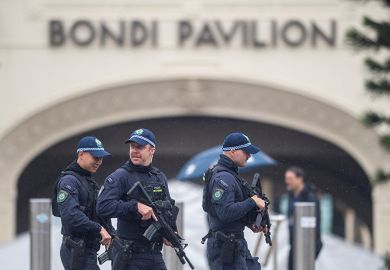Hundreds of academics have called on Queen Mary University of London to boycott an Israeli institution after they claim it contributed to the persecution of one of its academics and “endangered” her life.
Nadera Shalhoub-Kevorkian, a leading Palestinian feminist scholar, was arrested and detained by Israeli police in April shortly after she was suspended from teaching responsibilities by the Hebrew University of Jerusalem (HUJ).
Her colleagues at QMUL, where she is also a professor and the Lawrence D. Biele chair in law, have now called on their institution to issue a public statement in her defence and immediately suspend its partnership with HUJ.
The letter, which has been signed by more than 270 members of QMUL’s academic staff, accuses HUJ of “flagrant disregard for academic freedom and its failure in its duty of care for its own staff”.
In October, the Israeli university accused Professor Shalhoub-Kevorkian, who is a Palestinian citizen as well as holding both Israeli and American nationality, of “incitement and rabble-rousing” because a petition she signed described Israel’s assault on Gaza as genocide.
This accusation was shared across social media and provoked a “barrage of hate and threats of violence” toward Professor Shalhoub-Kevorkian, according to QMUL academics.
She was suspended in March by HUJ rector Asher Cohen after Israeli television condemned a podcast in which Professor Shalhoub-Kevorkian criticised Zionism while casting doubt on the scope of sexual assaults perpetrated by Hamas.
Despite this decision being retracted, she was arrested and detained by Israeli police in April, and her home was raided, but she was eventually released after magistrates found no substantial evidence to support the severity of the accusations.
According to the letter, Professor Shalhoub-Kevorkian was handcuffed, strip-searched, and held in a cold, dark room with only a blanket that “smelled of garbage and urine” during her detainment.
Campus resource collection: What can universities do to protect academic freedom?
The academic, a leading authority in the fields of trauma, childhood, state crime and criminology, surveillance, gender violence, law and society, was due to appear for further interrogation this week.
The QMUL academics say the atmosphere within Israel is making it “extremely dangerous” for academic staff and students to freely express non- or anti-Zionist positions, or even to call for a ceasefire in Gaza.
“Academic freedom has come under sustained attack and those who dare criticise Israel’s war on Gaza are routinely threatened and silenced,” they conclude.
“The president and rector of Hebrew University have paved the way for the persecution of Professor Shalhoub-Kevorkian, and contributed to an atmosphere that has endangered her life.”
The group of academics called on Colin Bailey, president of QMUL, to issue a public statement condemning the attack and arrest of their colleague, and to immediately suspend the institution’s partnership with HUJ.
The incident has provoked widespread letters of condemnation, with hundreds of Irish academics saying Professor Shalhoub-Kevorkian’s interrogation was an “intolerable attack on her rights as an academic”.
A separate letter, calling on all institutions and scholars to cut ties with the Israeli institution, has been signed by almost 1,000 academics around the world – including some from within HUJ itself.
They say that the decision to suspend Professor Shalhoub-Kevorkian fits into a broader context of Israeli universities that have “collaborated in Israeli occupation, oppression, and mass violence against Palestinians” for decades.
A QMUL spokesperson said the university remains concerned about her well-being, adding: “We are continuing to endeavour to ensure that she is aware of the support we provide to members of our academic community.”
HUJ said it was unable to comment.
Register to continue
Why register?
- Registration is free and only takes a moment
- Once registered, you can read 3 articles a month
- Sign up for our newsletter
Subscribe
Or subscribe for unlimited access to:
- Unlimited access to news, views, insights & reviews
- Digital editions
- Digital access to THE’s university and college rankings analysis
Already registered or a current subscriber?








